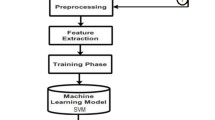Abstract
Twitter spam has for quite some time been a basic yet troublesome issue. Most kids’ users are not alert on spam issues while accessing the twitter account that will give harm without their acknowledgment. Up until now, scientists have fostered a progression of Machine Learning (ML) based strategies and boycotting procedures to distinguish spamming exercises on Twitter. To recognize spam, it had been ordered into various fields (counterfeit news, counterfeit connections, and substance), spam is identified based on these classes through ML techniques. In this paper, an experimental study is conducted by using ML algorithms to classify whether the tweet is spam or not. This can be done using Bayes theorem, a probabilistic theory is given by Naïve Bayes. Dataset is downloaded from the KAGGLE site which contains the dataset of spam and genuine tweets. The information preprocessed by standard articulations for the expulsion of undesirable information. The element will be changed over into a vector by applying all the arrangement strategies to the information. Term Frequency Inverse Document Frequency (TF-IDF) vectorizer will be utilized for changing over text into vector. Based on the results, The Naïve Bayes (NB) classifier achieved 98% accuracy result on the dataset compared to KNN and SVM.
Access this chapter
Tax calculation will be finalised at checkout
Purchases are for personal use only
Similar content being viewed by others
Notes
- 1.
0.987 is the accuracy when we calculate it using the equation
$${\rm{Accuracy}} = ({\rm{TP}}+{\rm{TN}})/({\rm{TP}}+{\rm{TN}}+{\rm{FN}}+{\rm{FP}})=0.98746658$$
References
A. Java, X. Song, T. Finin, B. Tseng, Why we twitter: understanding microblogging usage and communities, in Proceedings of the 9th WebKDD and 1st SNA-KDD 2007 Workshop on Web Mining and Social Network Analysis (2007), pp. 56–65
F. Benevenuto, G. Magno, T. Rodrigues, V. Almeida, Detecting spammers on twitter, in Collaboration, electronic messaging, anti-abuse and spam conference (CEAS), vol. 6 (2010), p. 12
C. Grier, K. Thomas, V. Paxson, M. Zhang, Spam: the underground on 140 characters or less, in Proceedings of the 17th ACM Conference on Computer and Communications Security (2010), pp. 27–37
S. Gunuc, O. Misirli, H.F. Odabasi, Primary school children’s communication experiences with twitter: a case study from Turkey. Cyberpsychol. Behav. Soc. Netw. 16(6), 448–453 (2013)
X. Zheng, Z. Zeng, Z. Chen, Y. Yu, C. Rong, Detecting spammers on social networks. Neurocomputing 159, 27–34 (2015)
Z. Chu, I. Widjaja, H. Wang, Detecting social spam campaigns on twitter, in International Conference on Applied Cryptography and Network Security (2012), pp. 455–472
A. Aggarwal, A. Rajadesingan, P. Kumaraguru, PhishAri: Automatic realtime phishing detection on twitter, in 2012 eCrime Researchers Summit (2012), pp. 1–12
J. Martinez-Romo, L. Araujo, Detecting malicious tweets in trending topics using a statistical analysis of language. Expert Syst. Appl. 40, 2992–3000 (2013)
S. Aiyar, N. Shetty, N-gram assisted youtube spam comment detection. Procedia Comput. Sci. 132, 174–182 (2018)
C. Kiliroor, C. Valliyammai, Social context based Naive Bayes filtering of spam messages from online social networks. Soft Comput. Data Anal. 699–706 (2019)
H. Gupta, M. Jamal, S. Madisetty, M. Desarkar, A framework for real-time spam detection in Twitter, in 2018 10th International Conference on Communication Systems & Networks (COMSNETS) (2018), pp. 380–383
H. Faris, A. Ala’M, A. Heidari, I. Aljarah, M. Mafarja, M. Hassonah, H. Fujita, An intelligent system for spam detection and identification of the most relevant features based on evolutionary random weight networks. Inf. Fusion 48, 67–83 (2019)
K. Adewole, N. Anuar, A. Kamsin, A. Sangaiah, SMSAD: a framework for spam message and spam account detection. Multimedia Tools Appl. 78, 3925–3960 (2019)
B. Kardaş, İ.E. Bayar, T. Özyer, R. Alhajj, Detecting spam tweets using machine learning and effective preprocessing, in Proceedings of the 2021 IEEE/ACM International Conference on Advances in Social Networks Analysis and Mining (2021), pp. 393–398
K. Reddy, E. Reddy, Detecting spam messages in twitter data by machine learning algorithms using cross validation. Int. J. Innov. Technol. Explor. Eng. (IJITEE) (2019)
I. Inuwa-Dutse, M. Liptrott, I. Korkontzelos, Detection of spam-posting accounts on twitter. Neurocomputing 315, 496–511 (2018)
K.U. Santoshi, S.S. Bhavya, Y.B. Sri, B. Venkateswarlu, Twitter spam detection using naïve bayes classifier, in 2021 6th International Conference on Inventive Computation Technologies (ICICT) (2021)
S. Sayed, S. Sawant, K. Redkar, S. Varma, Detection of real time spam tweet on twitter. Int. J. Eng. Res. & Technol. (IJERT) 10 (2021)
UtkMl’s Twitter Spam Detection Competition. Kaggle.com, 27 March 2019, www.kaggle.com/competitions/twitter-spam/data?select=sample_submission.csv. Accessed 18 May 2022
Acknowledgements
The authors would like to acknowledge the financial support from Ministry of Higher Education Malaysia (MOHE) under Fundamental Research Grant Scheme (FRGS) (Ref: FRGS/1/2021/ICT08/UTM/02/5) vote R.J130000.7851.5F462 and Research Management Center (RMC) of Universiti Teknologi Malaysia (UTM).
Author information
Authors and Affiliations
Corresponding author
Editor information
Editors and Affiliations
Rights and permissions
Copyright information
© 2023 The Author(s), under exclusive license to Springer Nature Switzerland AG
About this chapter
Cite this chapter
Alshammari, S., Aljabarti, E., Yusoff, Y. (2023). Protection of Users Kids on Twitter Platform Using Naïve Bayes. In: Yafooz, W.M.S., Al-Aqrabi, H., Al-Dhaqm, A., Emara, A. (eds) Kids Cybersecurity Using Computational Intelligence Techniques. Studies in Computational Intelligence, vol 1080. Springer, Cham. https://doi.org/10.1007/978-3-031-21199-7_8
Download citation
DOI: https://doi.org/10.1007/978-3-031-21199-7_8
Published:
Publisher Name: Springer, Cham
Print ISBN: 978-3-031-21198-0
Online ISBN: 978-3-031-21199-7
eBook Packages: Intelligent Technologies and RoboticsIntelligent Technologies and Robotics (R0)




